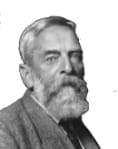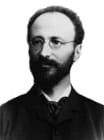Friedrich Freiherr von Wieser (1851-1926)

The value of goods is derived from the value of wants
Friedrich von Wieser taught at the universities of Vienna and Prague and succeeded Carl Menger at the University of Vienna in 1903. Together with his brother-in-law Eugen v. Boehm-Bawerk, Friedrich von Wieser shaped the 3rd generation of Austrian economists including Ludwig von Mises or Joseph A. Schumpeter. He was the last Minister of Commerce of the Habsburg Empire. F. von Wieser’s two main contributions to economic science are the Theory of Imputation, which established that factor prices are determined by output prices and his Principle of Opportunity Cost, which is the foundation of the Theory of Subjective Value. His term Grenznutzen became a standard as the Principal of Marginal Utility, which considers value as a natural category that would belong to any society no matter what property institutions had been established. The famous economic calculation debate of the 1930s (between the Austrians and socialist academics) began with von Wieser’s notion of the paramount importance of accurate calculation for economic efficiency. His major works include such classics as Der natürliche Wert (1889), Social Economics (1914) or his last book Das Gesetz der Macht (1926).
Friedrich von Wieser was born on July 10, 1851 to a notable family of Austrian government officials. He was the son of Privy Councilor Leopold von Wieser, a high-ranking official in the KuK War Ministry and studied law at the University of Vienna and graduated there in 1872. Following the family tradition, Wieser joined public service as a government employee the same year, and like his close friend and later brother-in-law Eugen von Boehm-Bawerk was awarded a state scholarship to do more detailed economic research in 1875. Both scholars spent about two years at the universities of Heidelberg, Leipzig and Jena (with profs. K. Knies, W. Roscher and B. Hildebrand, all members of the German Historical School). However, it was neither one of them who stimulated or even left any mark on Wieser’s or Boehm-Bawerk’s thinking. To the contrary, it was Carl Menger and his seminal book ‘Principles of Economics’, which inspired and greatly influenced them.
After some years in the KuK Imperial civil service, Wieser returned to academia in 1883, and successfully published his first book Über den Ursprung und die Hauptgesetze des wirthschaftlichen Werthes in 1884. The same year he was appointed professor of political economics at the famous German speaking Charles University in Prague and devoted his research chiefly to problems of currency, taxation and matters of social and economic policy. However, he also worked on the political and cultural problems of Bohemia, particularly its German-speaking minority. In 1889 his seminal book Der natürliche Werth (Natural Value) appeared in Vienna and initiated the crucial debates on the Theory of Value and the Theory of Imputation. This book gained him almost immediate acclaim and, as a major achievement of this time it was translated into English within 4 years, and introduced by William Smart.
When Wieser was elected president (rector) of the Charles University he delivered his first excursion into sociology in an address, “Über die gesellschaftlichen Gewalten” (1901). In this important essay he not only combined his work on the value of money with his increasing concern with political and sociological issues. This wor was also an incidental but important study on the theory of urban rents.
Only two years after he assumed the rectorship in Prague, Wieser returned to his alma mater the University of Vienna in 1903 in order to succeed Carl Menger, whose train of thought he led into the next generation of the Austrian School of Economics. In 1911 Wieser published his Das Wesen und der Hauptinhalt der theoretischen Nationaloekonomie, which preceded another of his groundbreaking contributions, namely the principle of Opportunity Cost. It was here that he first coined the very fitting term opportunity cost and gave shape to the theory that marked the beginning of the distinction between the cost of production and economic cost, i.e. the cost of production plus the opportunity cost of not being able to obtain an alternative. Here Wieser also invented another fitting term Grenznutzen (marginal utility), which is based on the value of productive resources on their contribution to the final product, recognizing that changes in the amount used of one productive factor would alter the productivity of other factors.
However, Friedrich von Wieser was also perfecting Carl Menger’s important study of currency, which discussed both the historical evolution of money and the theory of its value, by introducing a definition of cost, which is compatible with the Theory of Marginal Utility. Wieser used Menger’s monetary theory from which he devised his own. Although Wieser’s idea was initially rejected by several mainstream economists, it was his disciple Ludwig von Mises who made it the basis of his seminal Theorie des Geldes und der Umlaufmittel (Theory of Money).
Mention must also be made that for Wieser nothing should be more obvious than that no economic system can function according to any design when its most important parameters of action, such as wages, prices, or interest rates are transferred to politicians and planners. He highlighted the importance of the free entrepreneur to economic change which he defined as being caused by some spontaneous intervention of individual men appearing as leaders on new economic frontiers. This managerial idea was later expounded by his direct pupil Joseph A. Schumpeter’s famous treatment of economic innovation, which for Schumpeter is a “process of industrial mutation that incessantly revolutionizes the economic structure from within, incessantly destroying the old one, incessantly creating a new one.”
The sudden and unexpected death of Eugen von Boehm Bawerk only days after the tragedy of WWI began was striking a hard blow to Wieser. from which he only slowly recovered. He only slowly recovered from the loss of his best friend, his brother-in-law and fellow Austrian scholar at the University of Vienna.
However, shortly before the outbreak of World War I, Wieser’s Theorie der gesellschaftlichen Wirtschaft (Social Economics) appeared in Vienna in 1914. It is the only systematic treatise on general economic theory produced by the 2nd generation of the Austrian School of Economics and also paved the way to what later became the Theory of Imperfect Competition. Due to the fact that there is hardly another author who owes so little to other scholars as Wieser, this book is like all of his works a highly personal and distinctive statement.
Although Wieser was fully committed to his students he eventually entered the Austrian political arena in 1917 when he was named a lifetime member of the Reichstag, the upper house of the Austrian parliament. During the summer of 1917 he was appointed Minister of Trade and served until the end of WWI. While the tragedy of the collapse of the Austro-Hungarian Empire was already in sight, he was mainly concerned with the planning of a postwar customs union with Germany. In 1919 he returned to academia but retired from active teaching only 4 years later. It seems that this time gave him the final impulse to the resumption of his sociological work. Shortly before his death in Salzburg in 1926 his last book, Das Gesetz der Macht was published in Vienna. Built on David Hume’s controversial thesis that all power rests on opinion, this treatise describes the role that elites of various sorts play in all power structures.
Two of his unpublished works appeared posthumously, ‘Geld’ (Money) in 1927, summarizing his monetary theory and his Gesammelte Abhandlungen, edited with a lengthy introduction by his pupil Friedrich A. von Hayek in 1929. Wieser’s most important contribution is that he was able to combine the Austrian theory of utility with an evolutionary theory of institutions by offering solutions to the so-called ‘Tragedy of the Commons’.
Kurt R. Leube






































